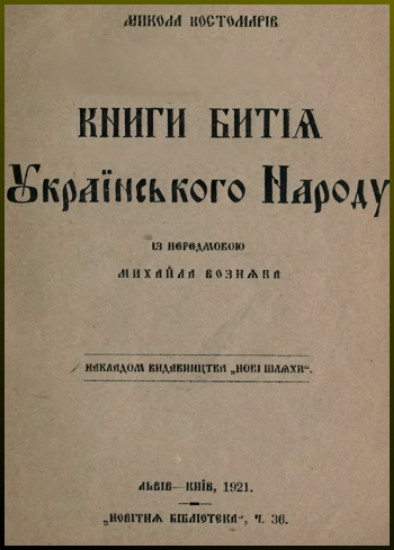Knyhy bytiia ukraïns’koho narodu
Knyhy bytiia ukraïns’koho narodu (Книги битія українського народу; The Books of Genesis of the Ukrainian People). The main ideological and programmatic statement of the Cyril and Methodius Brotherhood, written by Mykola Kostomarov in 1846 and called the Zakon Bozhyi (Divine Law) in the official police investigation of the brotherhood. The Knyhy was the political culmination of the Ukrainian national renaissance of the early 19th century. It was greatly influenced by the ideas of Western European romanticism, Slavophilism, the Decembrist movement and the Society of United Slavs, the historical concepts of Istoriia Rusov (The History of the Rus’ People), and the revolutionary ideas of Taras Shevchenko. The title of the work and its literary style, especially in the first half, are reminiscent of Adam Mickiewicz's Księgi narodu polskiego i pielgrzymstwa polskiego (Books of the Polish People and of the Polish Pilgrimage).
In the context of a broad ‘Christian’ interpretation of world history, the Knyhy chronicles how each nation in turn fell from grace by succumbing to despotic monarchs or foreign domination. In the end, only the Ukrainians founded a democratic Christian society, the Cossack Host (see Cossacks), the idealization of which is a prominent theme of the book. In a biblical style equating democracy with Christianity, the Knyhy stresses the mystical mission of the Slavs and the messianic role of the Ukrainians in particular. It calls for an end to the national oppression of Ukraine and advocates the establishment of a union of autonomous Slavic states under the leadership of a ‘resurrected’ Ukrainian nation.
Besides its message of Ukrainian nationalism, the Knyhy advocates a radical social program, calling for the emancipation of the serfs and an end to monarchism and privileges for the nobility.
Two versions of the Knyhy were uncovered during the police investigation of the Cyril and Methodius Brotherhood, one consisting of 104 paragraphs and the other of 109 paragraphs in Russian translation. The manuscripts were kept in the secret-police archives in Saint Petersburg until the Revolution of 1917 and have been preserved in the Central State Historical Archive in Moscow since then. The first unabridged edition of the Knyhy was published, with notes by Pavlo Zaitsev, in the Kyiv journal Nashe mynule, 1 (1918). Later editions were published by Mykhailo Vozniak in Lviv (1921) and by Elie Borschak in Paris (1946). A French translation by G. Luciani was published in 1956, and an English one by B. Yanivsky (pseud of Volodymyr Miiakovsky) in 1954.
BIBLIOGRAPHY
Semevskii, V. Kirillo-Mefodievskoe obshchestvo 1846–47 gg. (Moscow 1918)
Luciani, G. Le Livre de la Genèse du peuple ukrainien (Paris 1956)
Zaionchkovskii, P. Kirillo-Mefodievskoe obshchestvo (Moscow 1959)
Kostiv, K. Knyhy buttia ukraïns’koho narodu (Toronto 1980)
Arkadii Zhukovsky
[This article originally appeared in the Encyclopedia of Ukraine, vol. 2 (1988).]

